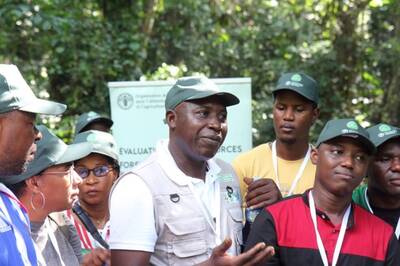
19 September 2023 – The seaside resort of Grand Bassam hosted the official opening ceremony of the regional workshop on the Global Forest Resources Assessment (FRA). About sixty participants from 24 French-speaking African countries are taking part in this capacity-building session organized by the Food and Agriculture Organization of the United Nations (FAO).
According to Anne Branthomme from FAO's Forestry Division, the aim is to finalize the national reports for FRA 2025. FAO publishes the State of the World's Forests every five years. For this forestry expert, these national reports are crucial for assessing the state and trends of forest resources in each country since 1990. The data collected follows a standardized methodology in all countries to provide a comprehensive view of forests at the national, regional and global levels. They cover different aspects of sustainable forest management, including the extent of forests and their changes, biomass and carbon, management objectives, disturbances, forest policies and legislation, and non-wood forest products.
The latest global assessment published by FAO in 2020 revealed that Africa is the continent with the most significant forest loss over the last decade. Between 2010 and 2020, it is estimated that Africa lost 3.9 million hectares of forest annually, mainly due to the expansion of small-scale agriculture. However, Africa's forest resources play a crucial role in the livelihoods of local populations and contain a huge amount of biodiversity. It is therefore essential to determine whether this worrying trend is continuing or whether there are signs of a change in direction.
At the opening of the workshop, Laurent Tchagba, Côte d'Ivoire's Minister of Water and Forests, stressed the importance of this event for forest conservation:
Forestry issues are high on the global agenda, and in recent decades much greater attention has been paid to changes in forest cover as a result of the climate crisis, which is tending to worsen. As a result, governments legitimately aspire to have relevant data at their disposal to guide national forest policies. The Global Forest Resources Assessment Programme initiated by the FAO is, therefore, a valuable aid in that it enables national reports on forest resources to be drawn up on a regular basis.
Attaher Maiga, the FAO Representative in Côte d'Ivoire, welcomed the commitment of African countries to this workshop and pointed out that the sustainable future of forest ecosystems and the people who depend on them is a global issue that requires collaboration, dialogue and coordinated action between forestry experts in the region. He stressed that better knowledge and reliable data on forests are needed to preserve them.
This workshop continues the work initiated by a series of online sessions organized this year by FAO. These sessions, aimed specifically at the region and in French, enabled the designated national correspondents and their collaborators to begin drafting their national reports.
One of the key points of the workshop was to guide participants in the use of the FRA platform for online reporting. This platform, designed to be simple and effective, made it easy to update and document data. Once validated, the updated data will be accessible to all via the same platform. In addition, innovative geospatial tools offering access to global spatial data were presented and made available to countries to improve forest analyses.
The workshop also placed particular emphasis on the quality assurance of FRA 2025 data, stressing the completeness, reliability, consistency and transparency of the information provided. It also offered countries the opportunity to share their experiences and propose solutions to the challenges faced by national correspondents in the reporting process.
Finally, the partnership with the Central Africa Forest Observatory (OFAC), which was present at the workshop, has also been strengthened in order to reduce the reporting burden and harmonize with other forest information collection processes. The aim of this increased collaboration is to pool efforts to collect and disseminate forestry data as effectively as possible.
Advancing the collection and dissemination of global forestry data
Since 1948, FAO has carried out forest resource assessments on the extent, state, management and use of the world's forest resources. Evolving over the years to meet society's current needs, the assessments take place every five years and are based on expert analysis, remote sensing and statistics. FRA's findings provide a factual basis for decisions and recommendations by a range of stakeholders, including civil society, the private sector, governments and international conventions.
Launched in March 2023, this series of FRA 2025 regional and subregional workshops is designed to provide technical assistance and advice to national correspondents in the preparation of national FRA reports. These meetings also provide an opportunity to share progress with the FAO FRA team, other experts in the region and partners committed to improving knowledge on forests. In addition, these workshops help to build the skills needed to write reports on forests.
As part of its commitment to building capacity in monitoring and sustainable forest management, FAO has worked to improve forest data through this workshop. This is to ensure that decisions on forest use and efforts in this area are informed and coordinated.
FRA 2025 National Correspondents from French-speaking African countries and their collaborators are now well equipped with the tools and methodology needed to compile transparent and high-quality reports on forest resources.
The workshop was financially supported by the European Union, the Government of Finland and the Government of Norway.
To access the original source of this story, please click here.
